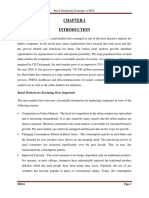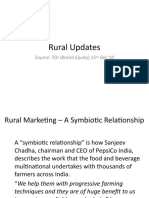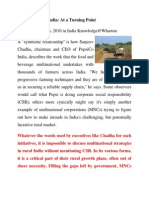Rural Marketing
Rural Marketing
Uploaded by
Niraj AgarwalCopyright:
Available Formats
Rural Marketing
Rural Marketing
Uploaded by
Niraj AgarwalOriginal Description:
Copyright
Available Formats
Share this document
Did you find this document useful?
Is this content inappropriate?
Copyright:
Available Formats
Rural Marketing
Rural Marketing
Uploaded by
Niraj AgarwalCopyright:
Available Formats
RURAL MARKETING.
Submitted To: Prof. Shibashish Chakraborty.
Prepared By:
Niraj Agarwal
Section-D
Enrollment No: 08BS0002006
Niraj Agarwal Page 1
TABLE OF CONTENTS
Acknowledgement 2
Introduction 4
What makes Rural India attractive? 5
Marketing Strategies for Rural India 6-9
ITC – Rural Marketing Strategy 10-13
Conclusion 14
References 15
Niraj Agarwal Page 2
ACKNOWLEDGEMENT
This project could not have been completed without Prof. Shibashish Chakraborty who
not only taught us Marketing Management-II but also encouraged and motivated us to do
challenging projects.
I am grateful towards him for giving us such a knowledge enhancing project. I thank him
for explaining the concepts so nicely that we could apply the same in a practical project easily.
Niraj Agarwal Page 3
INTRODUCTION
In recent years, rural markets of India have acquired significance, as the overall growth of the
Indian economy has resulted into substantial increase in the purchasing power of the rural
communities. On account of green revolution, the rural areas are consuming a large quantity of
industrial and urban manufactured products. In this context, a special marketing strategy,
namely, rural marketing has emerged. But often, rural marketing is confused with agricultural
marketing - the latter denotes marketing of produce of the rural areas to the urban consumers or
industrial consumers, whereas rural marketing involves delivering manufactured or processed
inputs or services to rural producers or consumers.
Niraj Agarwal Page 4
WHAT MAKES RURAL INDIA ATTRACTIVE?
It is an upcoming market and the following facts substantiate this-
800 million people
Estimated annual size of the rural market
• FMCG Rs 65,000 Crore
• Durables Rs 5,000 Crore
• Agri-inputs (incl. tractors) Rs 45,000 Crore
• 2 / 4 wheeler vehicles Rs 8,000 Crore
In 2001-02, LIC sold 55 % of its policies in rural India.
Of two million BSNL mobile connections, 50% are in small towns/villages.
Of the six lakh villages, 5.22 lakh have a Village Public Telephone (VPT)
41 million Kisan Credit Cards issued (against 22 million credit-plus-debit cards in urban)
with cumulative credit of Rs 977 billion resulting in tremendous liquidity.
42 million rural households are availing banking services in comparison to 27 million
urban households.
Investment in formal savings instruments: 6.6 million households in rural and 6.7 million
in urban India.
Nano-Marketing or sachets worked well in rural India and there is ample scope for the
products to be accepted by consumers if the price is competitive.
Niraj Agarwal Page 5
MARKRTING STRATEGIES TO CAPTURE RURAL INDIA
BY COMMUNICATING AND CHANGING QUALITY PERCEPTION
Companies are coming up with new technology and they are properly communicating it to
the customer. There is a trade of between Quality a customer perceives and a company
wants to communicate. Thus, this positioning of technology is very crucial. The perception
of the Indian about the desired product is changing. Now they know the difference between
the products and the utilities derived out of it. As a rural Indian customer always wanted
value for money with the changed perception, one can notice difference in current market
scenario.
BY PROPER COMMUNICATION IN INDIAN LANGUAGE
The companies have realized the importance of proper communication in local language
for promoting their products. They have started selling the concept of quality with proper
communication. Their main focus is to change the Indian customer outlook about quality.
With their promotion, rural customer started asking for value for money.
BY TARGET CHANGING PERCEPTION
If one go to villages they will see that villagers using Toothpaste, even when they can use
Neem or Babool sticks or Gudakhu, villagers are using soaps like Nima rose, Breeze,
Cinthol etc. even when they can use locally manufactured very low priced soaps. Villagers
are constantly looking forward for new branded products. What can one infer from these
incidents, is the paradigm changing and customer no longer price sensitive? Indian
customer was never price sensitive, but they want value for money. They are ready to pay
premium for the product if the product is offering some extra utility for the premium.
BY UNDERSTANDING CULTURAL AND SOCIAL VALUES
Companies have recognized that social and cultural values have a very strong hold on the
people. Cultural values play major role in deciding what to buy. Moreover, rural people are
emotional and sensitive. Thus, to promote their brands, they are exploiting social and
cultural values.
BY PROVIDING WHAT CUSTOMER WANT
The customers want value for money. They do not see any value in frills associated with
the products. They aim for the basic functionality. However, if the seller provides frills free
of cost they are happy with that. They are happy with such a high technology that can
Niraj Agarwal Page 6
fulfill their need. As "Motorola" has launched, seven models of Cellular Phones of high
technology but none took off. On the other hand, "Nokia" has launched a simple product,
which has captured the market.
BY PROMOTING PRODUCTS WITH INDIAN MODELS AND ACTORS
Companies are picking up Indian models, actors for advertisements as this helps them to
show themselves as an Indian company. Diana Hyden and Shahrukh Khan are chosen as a
brand ambassador for MNC quartz clock maker "OMEGA" even though when they have
models like Cindy Crawford.
BY ASSOCIATING THEMSELVES WITH INDIA
MNCs are associating themselves with India by talking about India, by explicitly saying
that they are Indian. M-TVduring Independence Day and Republic daytime make their logo
with Indian tri-color. Nokia has designed a new cellular phone 5110, with the India tri-
colour and a ringing tone of "Sare Jahan se achcha".
BY PROMOTING INDIAN SPORTS TEAM
Companies are promoting Indian sports teams so that they can associate themselves with
India. With this, they influence Indian mindset. LG has launched a campaign "LG ki Dua,
all the best". ITC is promoting Indian cricket team for years; during world cup they have
launched a campaign "Jeeta hai jitega apna Hindustan India India India". Similarly,
Whirlpool has also launched a campaign during world cup.
BY TALKING ABOUT A NORMAL INDIAN
Companies are now talking about normal India. It is a normal tendency of an Indian to try
to associate him/her with the product. If he/she can visualize himself/herself with the
product, he /she become loyal to it. That is why companies like Daewoo based their
advertisements on a normal Indian family.
BY DEVELOPING RURAL-SPECIFIC PRODUCTS
Many companies are developing rural-specific products. Keeping into consideration the
requirements, a firm develops these products. Electrolux is working on a made-for India
fridge designed to serve basic purposes: chill drinking water, keep cooked food fresh, and
to withstand long power cuts.
Niraj Agarwal Page 7
BY GIVING INDIAN WORDS FOR BRANDS
Companies use Indian words for brands. Like LG has used India brand name "Sampoorna"
for its newly launched TV. The word is a part of the Bengali, Hindi, Marathi and Tamil
tongue. In the past one year, LG has sold one lakh 20-inch Sampoorna TVs, all in towns
with a population of around 10,000.
BY ACQUIRING INDIAN BRANDS
As Indian brands are operating in India for a long time and they enjoy a good reputation in
India. MNCs have found that it is much easier for them to operate in India if they acquire
an Established Indian Brand. Electrolux has acquired two Indian brands Kelvinator and
Allwyn this has gave them the well-established distribution channel. As well as trust of
people, as people believe these brands. Similarly Coke has acquired Thumps up, Gold Spot,
Citra and Limca so that they can kill these brands, but later on they realized that to survive
in the market and to compete with their competitor they have to rejuvenate these brands.
BY EFFECTIVE MEDIA COMMUNICATION
Media Rural marketing is being used by companies. They can either go for the traditional
media or the modern media. The traditional media include melas, puppetry, folk theatre etc.
while the modern media includes TV, radio, e-chaupal. LIC uses puppets to educate rural
masses about its insurance policies. Govt of India uses puppetry in its campaigns to press
ahead social issues. Brook Bond Lipton India ltd used magicians e_ectively for launch of
Kadak Chap Tea in Etawah district. In between such a show, the lights are switched of and
a torch is flashed in the dark (EVEREADYs tact).
BY ADOPTING LOCALISED WAY OF DISTRIBUTING
Proper distribution channels are recognized by companies. The distribution channel could
be big scale Super markets; they thought that a similar system can be grown in India.
However, they were wrong; soon they realized that to succeed in India they have to reach
the nook and the corner of the country. They have to reach the "local Paan wala, Local
Baniya" only they can succeed. MNC shoe giants, Adidas, Reebok, and Nike started with
exclusive stores but soon they realized that they do not enjoy much Brand Equity in India,
and to capture the market share in India they have to go the local market shoe sellers. They
have to reach to local cities with low priced products.
Niraj Agarwal Page 8
BY ASSOCIATING THEMSELVES WITH INDIAN CELEBRITIES
MNCs have realized that in India celebrities enjoyed a great popularity so they now
associate themselves with Indian celebrities. Recently Luxor Writing Instruments Ltd. a JV
of Gillette and Luxor has launched 500 "Gajgamini" range of Parker Sonnet Hussain
special edition fountain pens,priced at Rs. 5000. This pen is signed by Mr. Makbul Fida
Hussain a renowned painter who has created "Gajgamini" range of paintings. Companies
are promoting players like Bhaichung Bhutia, who is promoted by Reebok, so that they can
associate their name with players like him and get popularity.
MELAS
Melas are places where villagers gather once in a while for shopping. Companies take
advantage of such events to market their products. Dabur uses these events to sell products
like JANAM GHUTI(Gripe water). NCAER estimates that around half of items sold in
these melas are FMCG products and consumer durables. Escorts also display its products
like tractors and motorcycles in such melas.
PAINTINGS
A picture is worth thousand words. The message is simple and clean. Rural people like the
sight of bright colours. COKE, PEPSI and TATA traders advertise their products through
paintings.
Niraj Agarwal Page 9
ITC (Agri Business Division)
ITC's pre-eminent position as one of India's leading corporates in the agricultural sector is based
on strong and enduring farmer partnerships, that has revolutionized and transformed the rural
agricultural sector. A unique rural digital infrastructure network, coupled with deep
understanding of agricultural practices and intensive research, has built a competitive and
efficient supply chain that creates and delivers immense value across the agricultural value chain.
One of the largest exporters of agri products from the country, ITC sources the finest of Indian
Feed Ingredients, Food Grains, Edible Nuts, Marine Products, Processed Fruits, Coffee & Spices.
ITC’s Agri Business Division, one of India’s largest exporters of agricultural commodities, has
conceived e-Choupal as a more efficient supply chain aimed at delivering value to its customers
around the world on a sustainable basis.
The e-Choupal model has been specifically designed to tackle the challenges posed by the unique
features of Indian agriculture, characterised by fragmented farms, weak infrastructure and the
involvement of numerous intermediaries, among others.
Niraj Agarwal Page 10
Why into Rural Marketing?
ITC entered into rural marketing because it understood the problems faced by the farmers and
also realized the vast opportunity it can capitalize using its mammoth reserves and surplus. The
problems faced by farmers can be best explained with –
Thus it clearly explains that farmers basically suffered from 2 D’S
Deep Sea Institutional support
o Information of farming best practices
o Information on weather
o Quality and Information on inputs
Devil – Middle man
o Price Discovery
o Quality and Weightment
o Handling Loss
Niraj Agarwal Page 11
The root cause and implications can be sumarised as –
Root Causes Implications
Fragmentation Weak Bargaining Power
Dispersion No access to real time information
Heterogeneity Need for customized knowledge
The e-choupal initiative of ITC helped farmers of rural India in following ways –
“e” helps overcome 2 D’s in following ways –
Price discovery before deciding to sell.
Freedom of choice for transaction.
Payment – cash on spot.
Knowledge on farming best practices.
Information on weather.
High quality products and solutions – usage.
It provided power of scale to farmers.
It led to overall improvement in productivity.
Sanchalaks has built tremendous trust and credibility in villages.
Niraj Agarwal Page 12
RURAL MARKETING STRATEGY – 4 A’S
Availability: It emphasizes on the availability of the
goods and services to the end consumers. In the case
of e-choupal the products are available continuously
because sanchalaks maintains continuous inventory
and maintains aggregate demnand.
Affordability: It focuses on product pricing. ITC
buys from farmers directly in the last days closing
price and even pays them for transportation. Goods
are weighted electronically and hence farmers are no
more cheated as they used to be previously. Hence it is a win-win situation both for farmers and
the company.
Acceptability: It focuses on convincing the customer to buy the product. ITC’s e-choupal
initiative is proving the farmers with real time updated information on weather. It is providing
them customized knowledge in the form of farm management and risk management. It is also
providing them lower transaction cost. It is also providing them financial services in the form of
life, general, health and crop insurance.
Awareness: It focuses on making people aware
of the product. It is providing active servicing up
to rural outlets. It is providing them with wide
range of product categories. Moreover it has
made entrepreneurs out of farmers as they are
managing most of the work, it instills in them the
sense of ownership.
This enthusiastic response from farmers has encouraged ITC to plan for the extension of the ‘e-
Choupal’ initiative to altogether 15 states across India over the next few years. On the anvil are
plans to channelise other services related to micro-credit, health and education through the
same 'e-Choupal' infrastructure.
Niraj Agarwal Page 13
CONCLUSION
ITC e-Choupal, an innovative strategy which is elaborative and extensive in rural markets so far.
Critical factors in the apparent success of the
venture are ITCs extensive knowledge of
agriculture, the eort ITC has made to retain
many aspects of the existing production
system, including retaining the integral
importance of local partners, the companies
commitment to transparency, and the respect
and fairness with which both farmers and local
partners are treated.
The concepts, which are becoming more important in every market, include color, product
attractiveness visibility, and display quality. In addition, availability (meeting local demand by
increasing production locally), acceptability (building brand equity), and affordability (pricing
higher than local brands, but adapting to local conditions) are the key factors.
Niraj Agarwal Page 14
REFERENCES
Kashyap,Pradeep and Raut, Siddhartha. The Rural Marketing Book- Text & Practice,
New Delhi: Biztantra,2005-06,381p
http://www.itcportal.com/sets/echoupal_frameset.htm
http://www.itcportal.com/sets/agriexp_frameset.htm
http://www.echoupal.com/
Niraj Agarwal Page 15
You might also like
- Metropolis Franchisee Guide BookDocument15 pagesMetropolis Franchisee Guide BookAnurrag Kumar67% (3)
- Case 1Document8 pagesCase 1Abhishek ShuklaNo ratings yet
- Beautiful Legs by PostDocument50 pagesBeautiful Legs by PostPreeti Iyer0% (1)
- CGPA Calculation For ICFAI Business SchoolDocument4 pagesCGPA Calculation For ICFAI Business SchoolNiraj Agarwal0% (2)
- A Great North Eastern Railway Case StudyDocument5 pagesA Great North Eastern Railway Case StudyTamás KozákNo ratings yet
- Rural Marketing.: Submitted To: Prof. Shibashish ChakrabortyDocument15 pagesRural Marketing.: Submitted To: Prof. Shibashish ChakrabortyPaushali MandalNo ratings yet
- 2 Strategies: 2.1 by Communicating and Changing Qual-Ity PerceptionDocument19 pages2 Strategies: 2.1 by Communicating and Changing Qual-Ity Perceptionvidhit_rkNo ratings yet
- Marketing Innovative Strategies Effects On FMCG Companies in India Rural RegionsDocument19 pagesMarketing Innovative Strategies Effects On FMCG Companies in India Rural Regions7manu100% (1)
- 2 Strategies 2.1 by Communicating and Changing QualDocument4 pages2 Strategies 2.1 by Communicating and Changing QualAkshita JoshiNo ratings yet
- Chapter-1: Rural Markets Are Becoming More ImportantDocument19 pagesChapter-1: Rural Markets Are Becoming More ImportantShruti Roy RCNo ratings yet
- Rural Marketing A Case Study On HindustaDocument13 pagesRural Marketing A Case Study On HindustaVairag ShahNo ratings yet
- Rural Marketing in Indian ContextDocument5 pagesRural Marketing in Indian ContextSikander Khilji100% (1)
- 11 - Rural MKTDocument20 pages11 - Rural MKTBipclass FYNo ratings yet
- Rural Updates: Source: TOI (Brand Equity) 15 Dec'10Document21 pagesRural Updates: Source: TOI (Brand Equity) 15 Dec'10nehaasNo ratings yet
- Marketing Strategy of FMCG Product: A Case Study of Hindustan Unilever LimitedDocument3 pagesMarketing Strategy of FMCG Product: A Case Study of Hindustan Unilever LimitedSundaramNo ratings yet
- 07 - Rural MarketingDocument21 pages07 - Rural MarketingBipclass TYNo ratings yet
- Rural Marketing Assignment - Vinay BhandolkarDocument15 pagesRural Marketing Assignment - Vinay BhandolkarSharanyan IyengarNo ratings yet
- Case Study - NestleDocument5 pagesCase Study - NestleAnushka DoresNo ratings yet
- Innovations in Rural MarketingDocument45 pagesInnovations in Rural Marketingmpmmbtpd50% (2)
- Rural Marketing Case StudiesDocument6 pagesRural Marketing Case StudiesRupesh MalikNo ratings yet
- Rural Marketing: An Indian PerspectiveDocument17 pagesRural Marketing: An Indian PerspectiveHashim KhatriNo ratings yet
- Rural MarketingDocument4 pagesRural MarketingSachin WakhradkarNo ratings yet
- Innovation and Creativity in Rural Retail Marketing in India 1 4Document10 pagesInnovation and Creativity in Rural Retail Marketing in India 1 4samuelNo ratings yet
- Brand Penetration in RuralDocument15 pagesBrand Penetration in RuralAnurag KushwahaNo ratings yet
- MNC in Rural India - WhartonDocument4 pagesMNC in Rural India - WhartonhimanshusmitaNo ratings yet
- Pacific Business School Udaipur: Project Title-Rural Marketing Innovation and OpportunitiesDocument17 pagesPacific Business School Udaipur: Project Title-Rural Marketing Innovation and OpportunitiesRavinder SaroyNo ratings yet
- Rural Marketing Complete2Document88 pagesRural Marketing Complete2Angad SinghMehtaNo ratings yet
- MNCs in Rural IndiaDocument23 pagesMNCs in Rural IndiapratikNo ratings yet
- Final Reverse Innovation PaperDocument11 pagesFinal Reverse Innovation PaperAbhishek VermaNo ratings yet
- Case Study On Rural Marketing - Ravi From P.b.siddhartha, VijayawadaDocument20 pagesCase Study On Rural Marketing - Ravi From P.b.siddhartha, VijayawadaRavi75% (4)
- Rural Marketing Research PaperDocument8 pagesRural Marketing Research PaperShazia JamalNo ratings yet
- Brands & Rural Marketing: Rural India: Why Brands Cannot Ignore Them AnymoreDocument3 pagesBrands & Rural Marketing: Rural India: Why Brands Cannot Ignore Them AnymoreAbhra Prova RayNo ratings yet
- Innovation in Rural Marketing in Indian Corporate SectorDocument5 pagesInnovation in Rural Marketing in Indian Corporate SectorMuzeeb SaifiNo ratings yet
- FMCG Rural ReportDocument5 pagesFMCG Rural ReportMandeep SinghNo ratings yet
- 4 A's of MarketingDocument4 pages4 A's of MarketingRevathi Ramesh Kumar100% (1)
- Rural Marketing Promotion StrategiesDocument19 pagesRural Marketing Promotion StrategiesProf S P Garg100% (3)
- Excellence in Management Practices" (ICEMP) April 2011.: Abstract For National Conference On"Document9 pagesExcellence in Management Practices" (ICEMP) April 2011.: Abstract For National Conference On"Swathi MkNo ratings yet
- Rural Marketing: Presented By: Group 5Document30 pagesRural Marketing: Presented By: Group 5Sana NaqviNo ratings yet
- A Study of Buying Behaviour of Rural Consumer: A Proposal With Reference To Kumaun Division of UttarakhandDocument4 pagesA Study of Buying Behaviour of Rural Consumer: A Proposal With Reference To Kumaun Division of UttarakhandEditor IJTEMTNo ratings yet
- Marketing To Rural India: Making The Ends MeetDocument7 pagesMarketing To Rural India: Making The Ends MeetshrvnpndNo ratings yet
- C CC C: ,,1c2c" 3cc C D$ C c4c/55c6c, c7cc C 89c$cc CC C$$ C C CC CC C $C$ c6c C CCCCDocument8 pagesC CC C: ,,1c2c" 3cc C D$ C c4c/55c6c, c7cc C 89c$cc CC C$$ C C CC CC C $C$ c6c C CCCCSupriyo MondalNo ratings yet
- Coca Cola Rural Marketing StrategyDocument7 pagesCoca Cola Rural Marketing StrategySurya SudharsanNo ratings yet
- FMCG Rural IndiaDocument6 pagesFMCG Rural IndiadilipmendaNo ratings yet
- Rural MRKTG 1Document16 pagesRural MRKTG 1Karan KhannaNo ratings yet
- Marketing To Rub AnsDocument3 pagesMarketing To Rub AnsmeegunNo ratings yet
- Rural Marketing InoDocument3 pagesRural Marketing InoBen MathewsNo ratings yet
- Communication Strategy For Rural MarketDocument6 pagesCommunication Strategy For Rural MarketFarshan SulaimanNo ratings yet
- Rural Marketing Mix - Brand & Channel ManagementDocument31 pagesRural Marketing Mix - Brand & Channel Managementbasavaraj nayakNo ratings yet
- Hul Rural Marketing StrategyDocument14 pagesHul Rural Marketing StrategyPramesh AnuragiNo ratings yet
- Rural Marketing: A Case Study On Hindustan Unilever Limited: Manpreet KaurDocument14 pagesRural Marketing: A Case Study On Hindustan Unilever Limited: Manpreet KaursanyasNo ratings yet
- Present Market Scenario Reason To Choose Rural Market 4 A S Approach Challenges Some Remarkable Initiatives by Companies Conclusion ReferencesDocument11 pagesPresent Market Scenario Reason To Choose Rural Market 4 A S Approach Challenges Some Remarkable Initiatives by Companies Conclusion ReferencesMandeep Kumar GoswamiNo ratings yet
- Rural MarketingDocument34 pagesRural MarketingSrijon MoitraNo ratings yet
- Tapping Indian Rural MarketDocument35 pagesTapping Indian Rural MarketDeepak PantNo ratings yet
- Marketing To Rural India: Making The Ends Meet: India Knowledge@WhartonDocument6 pagesMarketing To Rural India: Making The Ends Meet: India Knowledge@WhartonJaladhi PatelNo ratings yet
- Size of Rural MarketDocument6 pagesSize of Rural MarketSushant JaiswalNo ratings yet
- ResearchDocument8 pagesResearchmanishkhandal88No ratings yet
- Rural Marketing 920Document46 pagesRural Marketing 920nithinmamidalaNo ratings yet
- The 86% Solution (Review and Analysis of Mahajan and Banga's Book)From EverandThe 86% Solution (Review and Analysis of Mahajan and Banga's Book)No ratings yet
- DK Essential Managers: Doing Business in India: Culture, Travel, Negotiating, Etiquette, RelationshipsFrom EverandDK Essential Managers: Doing Business in India: Culture, Travel, Negotiating, Etiquette, RelationshipsNo ratings yet
- Impossible to Possible: Maruti's Incredible Success and How It Can Change IndiaFrom EverandImpossible to Possible: Maruti's Incredible Success and How It Can Change IndiaNo ratings yet
- Informal Services in Asian Cities: Lessons for Urban Planning and Management from the Covid-19 PandemicFrom EverandInformal Services in Asian Cities: Lessons for Urban Planning and Management from the Covid-19 PandemicNo ratings yet
- India's Store Wars: Retail Revolution and the Battle for the Next 500 Million ShoppersFrom EverandIndia's Store Wars: Retail Revolution and the Battle for the Next 500 Million ShoppersNo ratings yet
- Gsec Paper Index CreationDocument27 pagesGsec Paper Index CreationNiraj AgarwalNo ratings yet
- Union Budget 2010-11 by Pranab MukherjeeDocument5 pagesUnion Budget 2010-11 by Pranab MukherjeeNiraj AgarwalNo ratings yet
- Railway Budget by Mamta Banerjee 2010Document6 pagesRailway Budget by Mamta Banerjee 2010Niraj AgarwalNo ratings yet
- Transfer Pricing - Niraj AgarwalDocument13 pagesTransfer Pricing - Niraj AgarwalNiraj AgarwalNo ratings yet
- Branding United Colors of BenettonDocument8 pagesBranding United Colors of BenettonNiraj Agarwal100% (2)
- Retail Tech Trends 2020Document53 pagesRetail Tech Trends 2020Mike EdwardsNo ratings yet
- Customer Perceived Value and Customer SatisfactionDocument19 pagesCustomer Perceived Value and Customer SatisfactionYul FebriantiNo ratings yet
- 2.1 Critical Discourse Analysis: Chapter Two: Theoretical Framework and Literature ReviewDocument19 pages2.1 Critical Discourse Analysis: Chapter Two: Theoretical Framework and Literature ReviewmndtNo ratings yet
- Assignment For Mba MarketingDocument36 pagesAssignment For Mba MarketingpahalcollageNo ratings yet
- A Badasss Guide To Breaking Into DataDocument52 pagesA Badasss Guide To Breaking Into Datajuan.esteban.blancasNo ratings yet
- Build Your Own Brand Webinar3 - TranscriptDocument19 pagesBuild Your Own Brand Webinar3 - TranscriptJames SherriffNo ratings yet
- Independent University, BangladeshDocument12 pagesIndependent University, BangladeshMd.TahmidNo ratings yet
- SWOT AnalysisDocument8 pagesSWOT AnalysisAbc XyzNo ratings yet
- MAF661 Test 1 QDocument2 pagesMAF661 Test 1 QFredericaNo ratings yet
- 425 - Chapter 03-Maliha TribhuDocument25 pages425 - Chapter 03-Maliha Tribhusaimunayeasminchowdhury132002No ratings yet
- Industry Intelligence - Uber: Ridesharing Services Industry AnalysisDocument31 pagesIndustry Intelligence - Uber: Ridesharing Services Industry AnalysisRediet TsigeberhanNo ratings yet
- 2022 Marketing PredictionsDocument5 pages2022 Marketing PredictionsaddyyNo ratings yet
- Brand Identity Audit Range RoverDocument9 pagesBrand Identity Audit Range RoverAryan KumarNo ratings yet
- Kmart StrategyDocument28 pagesKmart Strategyclarkmba100% (28)
- Production and Operations Management: Reporters: Karl David Al-Shuwayer Riangelli Exconde Mba1A-RDocument13 pagesProduction and Operations Management: Reporters: Karl David Al-Shuwayer Riangelli Exconde Mba1A-RRiangelli ExcondeNo ratings yet
- Gucci S Marketing ProjectDocument94 pagesGucci S Marketing ProjectRaj KumarNo ratings yet
- A Summer Training Project Report OnDocument128 pagesA Summer Training Project Report OnHoney SinghNo ratings yet
- DomtyDocument6 pagesDomtyAhmed ZakariaNo ratings yet
- Post-Covid Changes in Consumer Preferences For Social Media Marketing in India PDFDocument20 pagesPost-Covid Changes in Consumer Preferences For Social Media Marketing in India PDFNitin SharmaNo ratings yet
- TanishqDocument18 pagesTanishqrock_on_rupz99100% (2)
- Case 1 Group 9Document12 pagesCase 1 Group 9lishugo100% (6)
- An Investigation of The Relationships Among Marketing Mix Variables and Brand Equity Dimensions State-Branded Food ProductsDocument31 pagesAn Investigation of The Relationships Among Marketing Mix Variables and Brand Equity Dimensions State-Branded Food ProductsNahom MarkosNo ratings yet
- Capital Prominent - Co Profile 2022 V3 Copy-1Document25 pagesCapital Prominent - Co Profile 2022 V3 Copy-1Rosnisa SahmatNo ratings yet
- Philips Company General Presentation: Key Messages of The Presentation AreDocument49 pagesPhilips Company General Presentation: Key Messages of The Presentation AreFemi KayodeNo ratings yet
- Presentation On Advertising and Sales Management: Topic - ParachuteDocument27 pagesPresentation On Advertising and Sales Management: Topic - ParachuterumpanNo ratings yet
- Business Strategy AssignmentDocument11 pagesBusiness Strategy AssignmentAssignment Helper0% (1)































































































